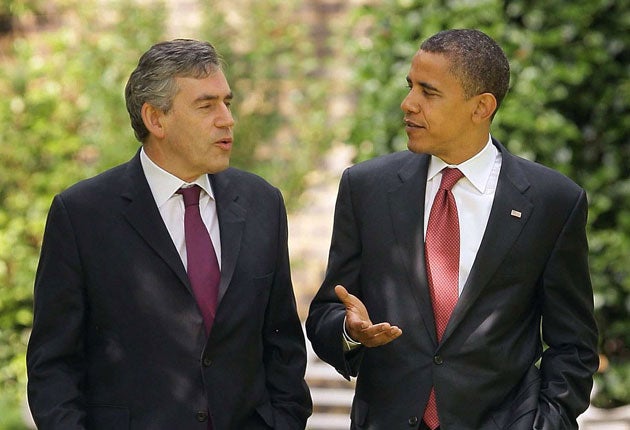Brown and Cameron clash over ‘new era’
Tories taunt PM over claims America’s choice of Obama signals ‘time for change’ in UK

Your support helps us to tell the story
From reproductive rights to climate change to Big Tech, The Independent is on the ground when the story is developing. Whether it's investigating the financials of Elon Musk's pro-Trump PAC or producing our latest documentary, 'The A Word', which shines a light on the American women fighting for reproductive rights, we know how important it is to parse out the facts from the messaging.
At such a critical moment in US history, we need reporters on the ground. Your donation allows us to keep sending journalists to speak to both sides of the story.
The Independent is trusted by Americans across the entire political spectrum. And unlike many other quality news outlets, we choose not to lock Americans out of our reporting and analysis with paywalls. We believe quality journalism should be available to everyone, paid for by those who can afford it.
Your support makes all the difference.The election of Barack Obama provoked a fierce clash between Gordon Brown and David Cameron after the Tory leader claimed he would benefit from a similar "time for change" factor at the general election.
Mr Cameron said: "In these difficult times, people everywhere are crying out for change. Barack Obama is the first of a new generation of leaders who will deliver it." He argued in the Commons that Mr Brown's recent attack on him as a "novice" was now redundant after change trumped experience in the US election.
The Prime Minister hit back, saying he had told the President-elect in a message of congratulation that "serious times need serious people". Ridiculing the Tories' stance on government borrowing, he said: "The only change that they represent is that they change their minds every week."
Labour strategists admit that Mr Cameron's "change" message may work now but believe the "Obama effect" will have faded by the time the British people vote in 2010. They stressed that the change in the US had been away from a right-wing party to a progressive one which shared many of Labour's values.
Mr Brown will speak to the President-elect on the telephone soon but they are unlikely to meet when he goes to Washington for a summit of world leaders on the financial crisis on 15 November. A formal meeting may have to wait until after the new President is installed in January.
The British embassy in Washington will be trying to put the Prime Minister in pole position for the new President's first meeting with a foreign leader. But the sharp-elbowed Nicolas Sarkozy may hold the trump card because France currently holds the European Union's rotating presidency.
Although Mr Brown was initially closer to the Clintons, his foreign policy chief Simon McDonald and special adviser Stewart Wood have close links with the Obama camp. There was a blip when a leaked memo by the Washington ambassador Sir Nigel Sheinwald suggested Mr Obama was "aloof", but Downing Street insiders claim it has long passed.
Team Brown is hoping for a more fruitful relationship than the Prime Minister has had with George Bush, which has been "business, not personal" in a deliberate contrast with Tony Blair's approach. The Prime Minister believes he shares the same values and policy agenda of the incoming President, who he described as "a true friend of Britain".
On reform of the financial system and bodies such as the United Nations, there should be broad agreement between President-elect Obama and Mr Brown. Ditto climate change, where the US election result should boost the prospects of a new international agreement to cut carbon emissions. Talks on the issue begin in Copenhagen next year.
One difficult area may be free trade. Although Mr Obama made protectionist noises while seeking the Democratic nomination, Mr Brown believes he is an internationalist at heart. Another potential problem is Iran's nuclear programme. On the face of it, President-elect Obama's desire for "unconditional engagement" is at odds with Britain and the UN's position that Tehran's nuclear enrichment programme must be suspended before negotiations can begin.
The two leaders should, however, have a common agenda on Iraq, as they both want out. Afghanistan might be a little more tricky but Mr Brown hopes the new president's demand for greater "burden sharing" by Nato members will be aimed primarily at Germany rather than turning into a call for yet more British troops. British officials believe the pair will agree on a "comprehensive" three-pronged approach in which any military "surge" would be backed up by economic and political change.
Mr Brown has spoken about the need to win "hearts and minds" in foreign affairs. He believes that rhetoric will chime with the instincts of the man who won the hearts and minds of the American people.
Join our commenting forum
Join thought-provoking conversations, follow other Independent readers and see their replies
Comments